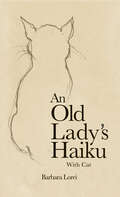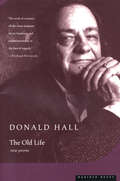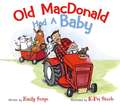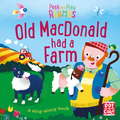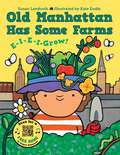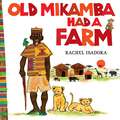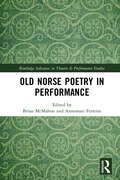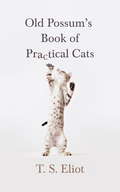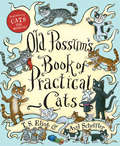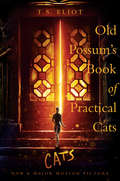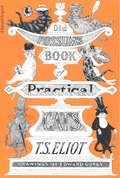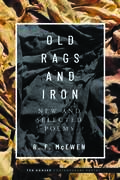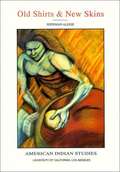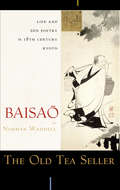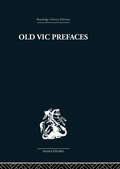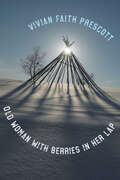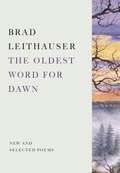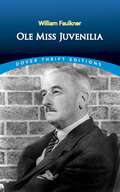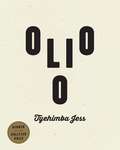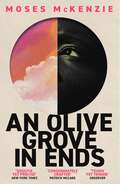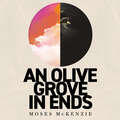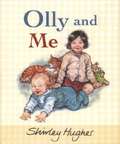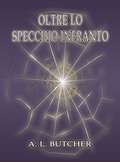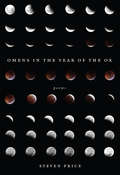- Table View
- List View
An Old Lady’s Haiku with Cat
by Barbara LoreiAt this point in my life, I&’m committed to my work, driven by a deep desire to communicate and explore the many mysteries around us. In a time when it&’s more urgent than ever to care for nature and one another, I create not just to please, but to provoke – to gently pause others in their tracks, inviting them to experience the profound, the playful, and perhaps to leave a little bit changed.My art and haiku often draw on mythology, religion, nature, and personal memories. In this way, I see myself as a storyteller, hoping to intrigue anyone who takes a moment to stop and look.
The Old Life: New Poems
by Donald HallFor nearly forty years, Donald Hall has stood in the front rank of American poets. The title poem, an autobiographical sequence, takes Hall from his boyhood to his growing acquaintance with poets--seniors like Robert Frost and contemporaries like Robert Bly. It sees him growing into manhood, fatherhood, grandfatherhood, and a happy second marriage. When his life inevitably moves into vicissitude, even tragedy, he will tell the dreadful truth about himself and the challenges of his time on earth.
Old MacDonald Had a Baby
by Emily SnapeA non-traditional family stars in Old MacDonald Had a Baby, a contemporary picture book from Emily Snape and K-Fai Steele. New babies are challenging! Old MacDonald, a young father, has his hands full. From feeding to diapering to bathing his baby, he soon realizes he needs LOTS of help from his animal friends, including a sheep, a cow, a chicken, a goat, and a dog. A two-dad family and a humorous cast of animals star in this contemporary fun and warm take on the familiar rhyme.
Old Macdonald had a Farm: A baby sing-along book (Peek and Play Rhymes #2)
by Pat-a-CakeOld Macdonald had a Farm combines lively pictures with a classic rhyme that's easy for parents and carers to recognise and recite. Young children will adore singing along and making animal noises. The spotting game at the end is a great incentive to go through the pages once again until each tiny thing is found! Nursery Rhymes are important stepping stones to language development. The rhymes usually tell a story, too, with a beginning, a middle and an end. This teaches children that events happen in sequence, and they begin to follow along. Nursery rhymes are also full of repetition making them easy to remember, and often become some of a child's first sentences. Also available: The Wheels on the Bus, Twinkle Twinkle Little Star, Hey Diddle Diddle
Old MacDonald Had A Farm
by Gris GrimlyA wholly original take on this beloved American anthem from renowned watercolor master, Gris Grimly--with a surprise twist ending bound to delight!Celebrated creator Gris Grimly, widely known for his gothic style illustrations, turns over a new creative leaf in his glorious interpretation of this beloved preschool anthem. Inspired by his son's love for Old MacDonald and his own family's farming history, and with stunning, sweeping watercolor illustrations, and a surprise twist ending that kids will relish, Gris brings this beloved song to glorious new life. Young children will love reading and singing along as they join our nimble footed Farmer on his morning jaunt across the farmyard and he greets each of his farm animals and beckons them to join his parade. Little ones will delight when the parade culminates in an unexpected e twist ending as Farmer opens the big red barn doors...and GASP...there's a BEAR hidden inside! With a moving artists' note from Gris explaining the history of this song, and his personal connection to it, this delightful retelling has all the makings of a classic.
Old Manhattan Has Some Farms
by Susan LendrothA clever new spin on "Old MacDonald," this fun book explores the popular trend of urban farming. From rooftop farms and gardens on Manhattan high rises to neighborhood gardens in empty lots in Atlanta to hydroponic gardens in Seattle, growing food locally has become an important part of city-dwelling life.Set to the tune of the popular children's song, this bouncy rhyming text will get everyone reading (or singing) out loud. If you're not comfortable singing aloud, download the free recording of the song created by popular children's performer Caspar Babypants (aka Chris Ballew, lead singer and songwriter for the band The Presidents of the United States of America). Six North American cities are highlighted, but included in the back matter are tips and tricks on how to alter the text so you can sing about your own hometown gardens.Back matter also includes more information about the different types of gardens introduced, additional resources, and the sheet music for the song.
Old Mikamba Had a Farm
by Rachel IsadoraThis fabulous version of the classic nursery song “Old MacDonald” introduces children to a menagerie of African animals and their sounds. It is beautifully illustrated by Caldecott Honor winner Rachel Isadora, with her signature collage-style artwork. Old Mikamba had a farm, E-I-E-I-O. And on this farm he had . . . a giraffe, a baboon, and an elephant! Meet Old Mikamba, who watches over a wide variety of animals on his game farm in the plains of Africa. Children will discover a whole new set of fun animal sounds as they are invited to sing along and roar with the lions, bellow with the rhino, whinny with the zebras, honk with the wildebeests, and more! A wonderful introduction to African wildlife that is great fun to read aloud, this truly irresistible rendition of a beloved song includes a list of animal fun facts and gives children a huge variety of animal sounds to imitate as they pore over the detailed animals, landscapes and patterns in the stunning illustrations.
Old Norse Poetry in Performance (Routledge Advances in Theatre & Performance Studies)
by Brian McMahon Annemari FerreiraThis book presents a range of approaches to the study of Old Norse poetry in performance. The contributors examine both eddic and skaldic poems and consider the surviving evidence for how they were originally recited or otherwise performed in medieval Scandinavia, Iceland and at royal courts across Europe. This study also engages with the challenge of reconstructing medieval performance styles and examines ways of applying the modern discipline of Performance Studies to the fragmentary corpus of Old Norse verse. The performance of verse by characters who appear in the Old Icelandic saga tradition is also considered, as is the cultural value associated not only with the poems themselves but with their various means of transmission and reception. This book will be of great interest to students and scholars in the fields of Old Norse studies, Performance and Theatre History.
Old Possum's Book of Practical Cats
by T. S. EliotA lighter side of the great poet. Old Possum's Book of Practical Cats will be a delightful surprise for any readers familiar with poem's like The Waste Land and Prufrock. Eliot playfully weaves his way through 13 vignettes about cats, starting with some observations on the importance of cats' names, before diving into the lives of individual felines. Cat burglars, magicians, thieves, and troublemakers populate the colourful cast of this wonderful book. Penguin Random House Canada is proud to bring you classic works of literature in e-book form, with the highest quality production values. Find more today and rediscover books you never knew you loved.
Old Possum's Book of Practical Cats: Cats Movie Tie-in (Faber Children's Classics Ser.)
by T. S. EliotT. S. Eliot’s famous collection of nonsense verse about cats—the inspiration for the Andrew Lloyd Webber musical Cats, now made into a major motion picture. This edition features vibrant illustrations by Axel Scheffler.
Old Possum's Book of Practical Cats: Cats Movie Tie-in (Faber Children's Classics Ser.)
by T. S. EliotThe inspiration for Andrew Lloyd Webber's iconic musical CATS, and its upcoming movie adaptation, directed by Tom Hooper and starring Taylor Swift (Bombalurina), Idris Elba (Macavity the Mystery Cat), Dame Judi Dench (Old Deuteronomy), Ian McKellen (Gus the Theatre Cat), James Corden (Bustopher Jones), Jennifer Hudson (Grizabella), Jason Derulo (Rum Tum Tugger), and Rebel Wilson (Jennyanydots).Cats! Some are sane, and some are mad.Some are good, and some are bad . . . These lovable cat poems were written by T. S. Eliot for his godchildren and continue to delight children and grown-ups. Eliot's beloved cat poems are a curious and artful homage to felines young and old, merry and fierce, small and unmistakably round.
Old Possum's Book of Practical Cats
by T. S. EliotCats! Some are sane, some are mad and some are good and some are bad. Meet magical Mr Mistoffelees, sleepy Old Deuteronomy and curious Rum Tum Tugger. But you'll be lucky to meet Macavity because Macavity's not there!In 1925 T. S. Eliot became co-director of Faber and Faber, who remain his publishers to this day. Throughout the 1930s he composed the now famous poems about Macavity, Old Deuteronomy, Mr Mistoffelees and many other cats, under the name of 'Old Possum'. In 1981 Eliot's poems were set to music by Andrew Lloyd Webber as Cats which went on to become the longest-running Broadway musical in history. This new edition, published on the 70th anniversary of the book and on the 80th anniversary of Faber and Faber, contains original colour illustrations by the award-winning illustrator of The Gruffalo, Axel Scheffler.
Old Rags and Iron: New and Selected Poems (Ted Kooser Contemporary Poetry)
by R. F. McEwenOld Rags and Iron is a collection of narrative poems about the life experiences of working-class people with whom the author, R. F. McEwen, is not only acquainted but whose lives he has shared. McEwen supplemented his income as a teacher while working as a professional logger and tree trimmer, and he writes with great love and respect for blue-collar families. Set primarily in the back-of-the-yard neighborhood of South Side Chicago, where McEwen grew up, as well as Pine Ridge, South Dakota, western Nebraska, Ireland, and elsewhere, the poems celebrate many voices and stories. Utilizing tree-trimming as a central metaphor, these poems of blank verse fictions reverberate like truth.
Old Shirts and New Skins
by Sherman AlexieSherman Alexie's poetic power renders an honest and painful perception of contemporary Native American life. In this collection, Alexie, a poet of the Coeur d'Alene people, speaks for the spirit of Native American resistance.
The Old Tea Seller: Life and Zen Poetry in 18th Century Kyoto
by BaisaoPoet, Zen Buddhist priest, renowned thinker, and seller of tea — Baisao was all of these things, as well as being a bit of an eccentric. Known to carry large wicker baskets filled with tea utensils through the streets and surrounding hills of Japan's capital, Baisao set up shop wherever he ended up and brewed tea for those who came to enjoy the scenery with him. Establishing a quiet, simple life, Baisao spent his final years composing poetry, brewing tea, and teaching Zen, in the process becoming a well–loved figure. These poems, memoirs, and letters tell us more about this endearing person and trace his long life's profound spiritual journey. This comprehensive translation includes nearly all of Baisao's writings, giving us a deep look at this remarkable man.
Old Vic Prefaces: Shakespeare and the Producer
by Hugh HuntOld Vic Prefaces is a collection of the author's talks to the actors on those plays which he produced, while a Director of the Old Vic from 1949 to 1953. The prefaces are unique in that they relate to actual performances, and each preface is followed by a short post-script in which the producer draws attention to some point that arose in production or in rehearsal, which illustrates the sort of problems that confront the producer of a Shakespeare play.
Old Woman with Berries in Her Lap (The Alaska Literary Series)
by Vivian Faith PrescottThrough a single descendant’s voice that speaks to the Sámi diaspora, this collection of poems is a journey through colonialism, transgenerational trauma, and identity. Many have heard of the Sámi reindeer herders brought to Alaska by Sheldon Jackson in the 1800s, but not much is known about the Sámi diaspora experiences in the state and beyond. The poems in Old Woman with Berries in Her Lap use the North Sámi language as well as graphics and various types of poetry to tell these stories of migration and diaspora. Vivian Faith Prescott’s use of language is both a celebration of the richness of the Sámi languages and a mourning of the loss of language that occurs when a population is displaced and forced to exist in a totally foreign language space. According to Sámilinguist, professor, and politician Ole Henrik Magga, the Sámi languages have “very easily . . . one thousand lexemes with connections to snow, ice, freezing, and melting.” These lexemes frame many of Prescott’s poems, introducing ideas and feelings around the loss of language and culture. A compelling insight into the Sámi culture from a contemporary poet’s eye, Old Woman with Berries in Her Lap juxtaposes past and present in an act of reclamation.
The Oldest Word for Dawn: New and Selected Poems
by Brad LeithauserFrom one of our most universally admired poets: a generous selection from his five acclaimed books of poetry, and an outstanding group of new poems. From the outset, Brad Leithauser has displayed a venturesome taste for quirky patterns, innovative designs sprung loose from traditional forms. In The Oldest Word for Dawn, we encounter a sonnet in one-syllable lines ("Post-Coitum Tristesse"), a clanging rhyme-mad tribute to the music of Tin Pan Alley ("A Good List"), intricate buried rhyme schemes ("In Minako Wada's House"), autobiography spun through parodies of Frost and Keats and Omar Khayyám ("Two Summer Jobs"). In a new poem, "Earlier," the poet investigates a kind of paradox: What is the oldest word for dawn in any language? The pursuit ultimately descends into the roots of speech, the genesis of art. "Earlier" is part of a sequence devoted to prehistoric themes: the cave paintings of Altamira, the disappearance of the Neanderthals, the poet's journey with his teenage daughter to excavate a triceratops skeleton in Montana . . . The author of six novels as well, Leithauser not surprisingly brings to his verse a flair for compelling narrative: a fateful romantic encounter on a streetcar ("1944: Purple Heart"); the mesmerizing arrival of television in a quiet Detroit neighborhood ("Not Lunar Exactly"); two boys heedlessly, joyfully bidding permanent farewell to a beloved sister ("Emigrant's Story"). The Oldest Word for Dawn reveals Brad Leithauser as a poet of surpassing tenderness and exactitude, a poet whose work, at sixty, fulfills the promise noted by James Merrill on the publication of his first book: "The observations glisten, the feelings ring true. These poems by a young, unostentatious craftsman are made to something very like perfection. No one should overlook them."
Ole Miss Juvenilia (Dover Thrift Editions)
by William FaulknerFaulkner's prolific publication history began at the age of 16 with poems and sketches for the Ole Miss campus newspaper, The Mississippian. The author continued to contribute to the publication throughout his student days at the university as well as after dropping out. These early works of poetry and prose reflect his gift for keen observations and the growing refinement of his voice as one of the greatest of America's Southern authors. Eighteen of Faulkner's elegant pen-and-ink drawings provide an atmospheric complement to the selections. An Introduction by noted Faulkner scholar Carvel Collins is also included.Mississippi native William Faulkner (1897–1962) made his reputation with such psychologically intense and technically innovative novels as The Sound and the Fury, As I Lay Dying, and Light in August, and he received the 1949 Nobel Prize for Literature in addition to two Pulitzer Prizes. Faulkner is especially noted for the rich literary landscape he created in the fictional setting of Yoknapatawpha County, from which he drew characters, places, and themes that reappeared throughout his fiction.
Olio
by Tyehimba JessWinner of the 2017 Pulitzer Prize in Poetry <p><p> Winner of the 2017 Anisfield-Wolf Book Award in Poetry <p> Winner of the 2017 Book Award from the Society of Midland Authors for Poetry <p> 2016 National Book Critics Circle Award finalist for poetry <p> 2017 PEN/Jean Stein Book Award finalist <p> 2017 Kingsley Tufts Poetry Award finalist <p> Named a top poetry book of spring 2016 by Library Journal <p> Part fact, part fiction, Tyehimba Jess's much anticipated second book weaves sonnet, song, and narrative to examine the lives of mostly unrecorded African American performers directly before and after the Civil War up to World War I. Olio is an effort to understand how they met, resisted, complicated, co-opted, and sometimes defeated attempts to minstrelize them.
An Olive Grove in Ends: The dazzling debut novel about love, faith and community, by an electrifying new voice
by Moses McKenzie*** ONE OF THE OBSERVER'S 10 MUST-READ DEBUT NOVELISTS OF 2022 ***'A rare glimpse into the harsh realities of street life and love in luminous prose, rendered with sensitivity and without sentimentalism. An astonishing debut' Cherie Jones, author of HOW THE ONE-ARMED SISTER SWEEPS HER HOUSESayon Hughes, a young Black man from Bristol, dreams of a world far removed from the one in which he was raised. Far removed from the torn slips outside the bookie's, the burnt spoons and the crooked solutions his community embraces; most of all, removed from the Christianity of his uncaring parents and the prejudice of law-makers.Growing up, Sayon found respite from the chaos of his environment in the love and loyalty of his brother-in-arms, Cuba; in the example of his cousin Hakim, a man once known as the most infamous drug-dealer in their neighbourhood, now a proselytising Muslim; and in the tenderness of his girl, Shona, whose own sense of purpose galvanises Sayon's. In return, Sayon wants to give the people he loves the world: a house atop a grand hill in the most affluent area of the city, a home in which they can forever find joy and safety. But after an altercation in which a boy is killed, Sayon finds his loyalties torn and his dream of a better life in peril.MORE PRAISE FOR AN OLIVE GROVE IN ENDS:'A remarkable debut, bristling with sharp prose and daring originality' Nathan Harris, author of THE SWEETNESS OF WATER'A phenomenally good novel, tense and thrilling and complex, with breath-stealing moments on every page' Donal Ryan, author of STRANGE FLOWERS'This consummately crafted work can only be a harbinger of a stellar and truly significant career. I urge you to read it' Patrick McCabe, author of THE BUTCHER BOY'Engrossing . . . A tough yet tender story of faith and friendship' OBSERVER
An Olive Grove in Ends: The dazzling debut novel about love, faith and community, by an electrifying new voice
by Moses McKenzieONE OF THE OBSERVER'S 10 MUST-READ DEBUT NOVELISTS OF 2022SOHO HOUSE BREAKTHROUGH WRITER AWARD 2022 WINNER'A rare glimpse into the harsh realities of street life and love in luminous prose, rendered with sensitivity and without sentimentalism. An astonishing debut' Cherie Jones, author of HOW THE ONE-ARMED SISTER SWEEPS HER HOUSESayon Hughes, a young Black man from Bristol, dreams of a world far removed from the one in which he was raised. Far removed from the torn slips outside the bookie's, the burnt spoons and the crooked solutions his community embraces; most of all, removed from the Christianity of his uncaring parents and the prejudice of law-makers.Growing up, Sayon found respite from the chaos of his environment in the love and loyalty of his brother-in-arms, Cuba; in the example of his cousin Hakim, a man once known as the most infamous drug-dealer in their neighbourhood, now a proselytising Muslim; and in the tenderness of his girl, Shona, whose own sense of purpose galvanises Sayon's. In return, Sayon wants to give the people he loves the world: a house atop a grand hill in the most affluent area of the city, a home in which they can forever find joy and safety. But after an altercation in which a boy is killed, Sayon finds his loyalties torn and his dream of a better life in peril.MORE PRAISE FOR AN OLIVE GROVE IN ENDS:'Announcing the arrival of a promising 23-year-old author whose work is wise beyond his years' GUARDIAN'A remarkable debut, bristling with sharp prose and daring originality' Nathan Harris, author of THE SWEETNESS OF WATER'A phenomenally good novel, tense and thrilling and complex, with breath-stealing moments on every page' Donal Ryan, author of THE SPINNING HEART'This consummately crafted work can only be a harbinger of a stellar and truly significant career. I urge you to read it' Patrick McCabe, author of THE BUTCHER BOY'Engrossing . . . A tough yet tender story of faith and friendship' OBSERVER
Olly and Me
by Shirley HughesWith typically charming realism, Shirley Hughes illustrates a special sibling bond that small children will find reassuringly familiar. A visit to the library, making pancakes with Dad, slooshing with water in the yard -- in this collection of poems and anecdotes, a young girl named Katie tells of her family and friends and the everyday moments that make up her world. Most especially, there is Olly, her little brother, who does many things with Katie and, to her chagrin, even tries to join in when she's doing ballet.
Oltre lo Specchio Infranto: Una raccolta di Poesia Oscura.
by A. L. ButcherUna collezione di poesia oscura sulla guerra, l'avvento del cancro e i capricci della vita.
Omens in the Year of the Ox
by Steven PriceSteven Price’s second collection is part of a long-lived struggle to address the mysteries that both surround and inhabit us. The book draws together moments both contemporary and historical, ranging from Herodotus to Augustine of Hippo, from a North American childhood to Greek mythology; indeed, the collection is threaded with interjections from a Greek-style chorus of clever-minded, mischievous beings—half-ghost, half-muse—whose commentaries tormentingly egg the writer on. In poems that range from free verse to prose to formal constructions, Price addresses the moral lack in the human heart and the labour of living with such a heart. Yet the Hopkins-like, sonorous beauty of the language reveals “grace and the idea of grace everywhere, in spite of what we do.” The pleasures of Price’s musicality permeate confrontation with even the darkest of human moments; the poems thus surreptitiously remind us that to confront our own darkness is one of the divine acts of which humans are capable.
